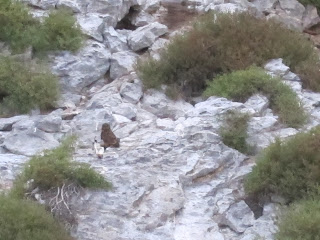In any case, Spanish stuck with me. When we went to
Ecuador, I found my Spanish to be as good as my Russian currently is, a level I
call pre-conversational. The little boys
in the Amazon school were delighted when I told them they were the ages of my
grandchildren, and I could ask anyone where the bathroom was and get there. In time.
On our first evening at the Yarina Lodge in the Amazon,
Steve approached the bar tender, Freddy (many of the Ecuadorians in tourist
locations carry English names), and told him we’d had Pisco Sours in the
Peruvian Amazon where they bragged theirs were the best anywhere. Steve then shamelessly played into the rivalry
between Peru and Ecuador and asked Freddy if he could make a Pisco Sour because
he (Steve) thought Freddy’s would be even better. Freddy thought a moment, pulling the recipe
out of his memory, and said, yes he could, but not until 6:20 or so, enough
time after the generator came on-line that the ice was made. Pandy, Betty, and I ordered them.
And Freddy’s Pisco Sours were really, really good. They were so good that the following evening,
six people ordered them.
The day after that, I skipped the afternoon hike because the
obligatory rubber boots irritated my sausage toe (see post of April 18), and, okay, mostly because I was tired of being around 18 other people all the time. Instead I took my Kindle up to the lodge veranda, sat
in an easy chair and elevated my foot on the coffee table.
Freddy came out of the kitchen and asked haltingly if we had really liked those Pisco Sours.
I reverted to Spanish (the only way to improve in a language is to use it), and I assured him that yes, yes we really did. He asked if we would want them again that
night. I told him that yes, yes, we
would. I told him that I only drank
Pisco Sours in the Amazon, and when I was in the Amazon, I only drank Pisco
Sours. He said that in that case he would go into
town to buy more, well I couldn’t understand what that was although I urged him not to go to a lot of trouble. It didn’t matter because it turned out that
what he really said was that as soon as the generator came on, he would make more ice.
Freddy's English was on the level of my Spanish, but with minimal vocabulary and maximum good will, we had a long conversation. Freddy is from Quito.
This is unusual because generally the flow of labor is away from the
scarcity of jobs along the Amazon and into the city. However, Freddy had always worked in food
service, and his employer in Quito would dock his wages an hour or even more if he
was only five minutes late or for other minor infractions. His aunt lives in the Amazon, and when she
told him about the job at the Yarina Lodge, he came and took it.
He works, to an American mind, very hard. Seven days a week, he sets up, serves and
clears breakfast, lunch and dinner. He
washes dishes (by hand; the generator for electricity runs only from 6:00 PM to
10:00 PM and is for the use of the guests), and he works the bar in the evenings. He makes much better money than he did in
Quito, and the employers are fair. He
works three weeks at the lodge, and on the
fourth week, he goes to visit his family in Quito. He misses his brothers (or perhaps brothers
and sisters, the word being the same in Spanish), but he is so much happier
with this good job.
I told Freddy that we had always wanted to go to the Galapagos, and we were headed there next. Freddie said the Galapagos were really
beautiful. He had not been there
himself, but his grandmother told him so.
With deep sadness, he told me his grandmother was now dead.
I told Freddie I was 65 years old, and maybe when he was
65, he would get to go, too. He grinned
and agreed that was possible; being 22, he certainly hoped he didn’t
have to wait that long.
These are all the things I talked about with Freddy on
the veranda of the Yarina Lodge. At
least, I’m pretty sure that’s what we said.
In the end I told him again how good his drinks were. I said, “Freddy, usted
es el Rey de Pisco Sours!” He laughed,
got up and went back to doing the dishes.














